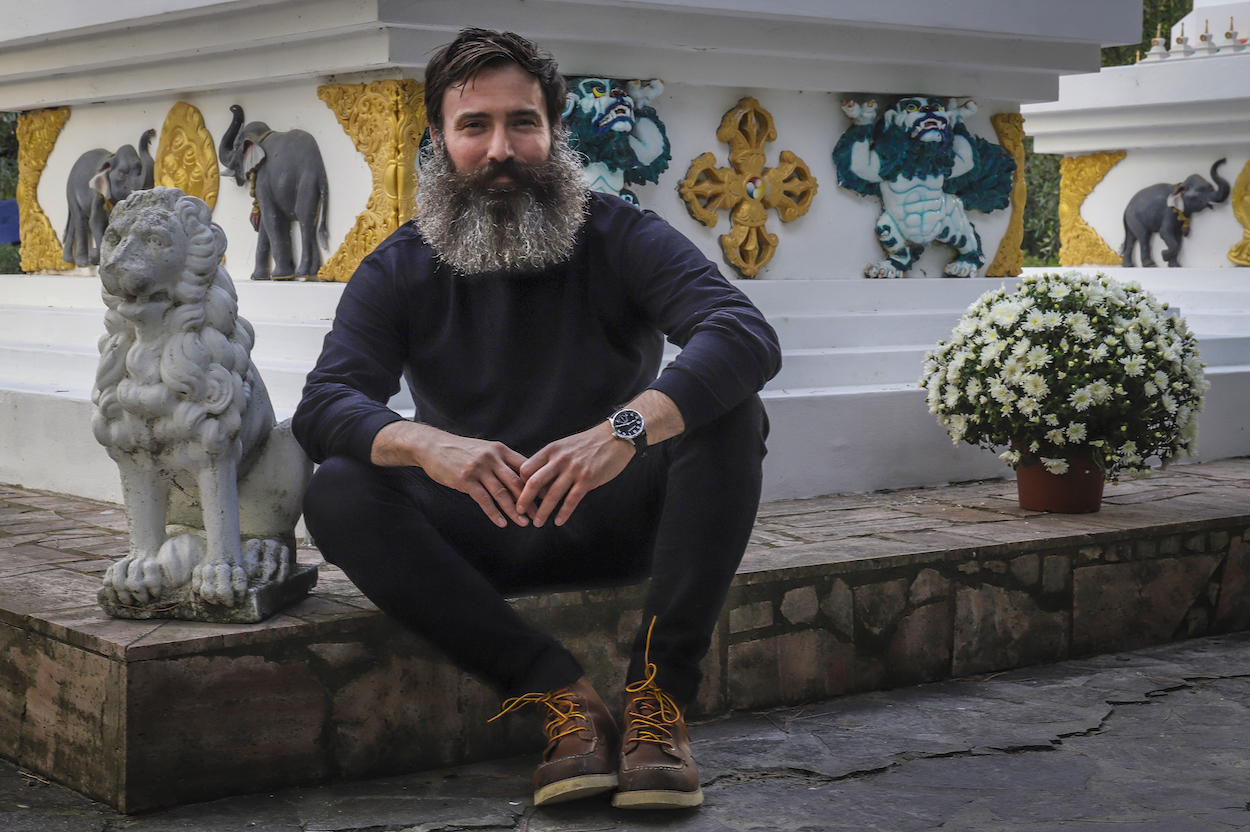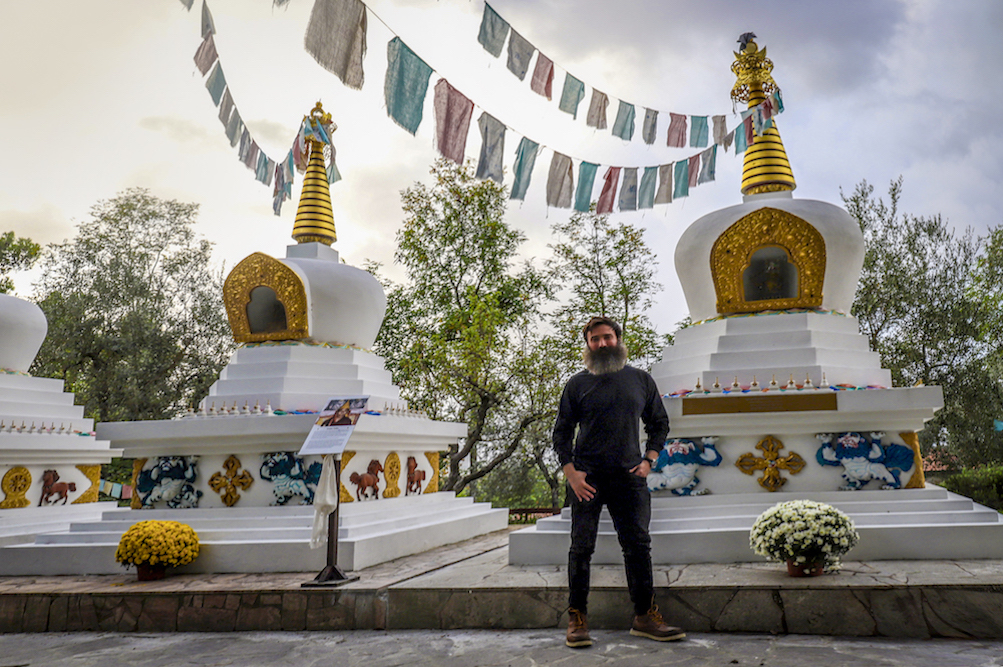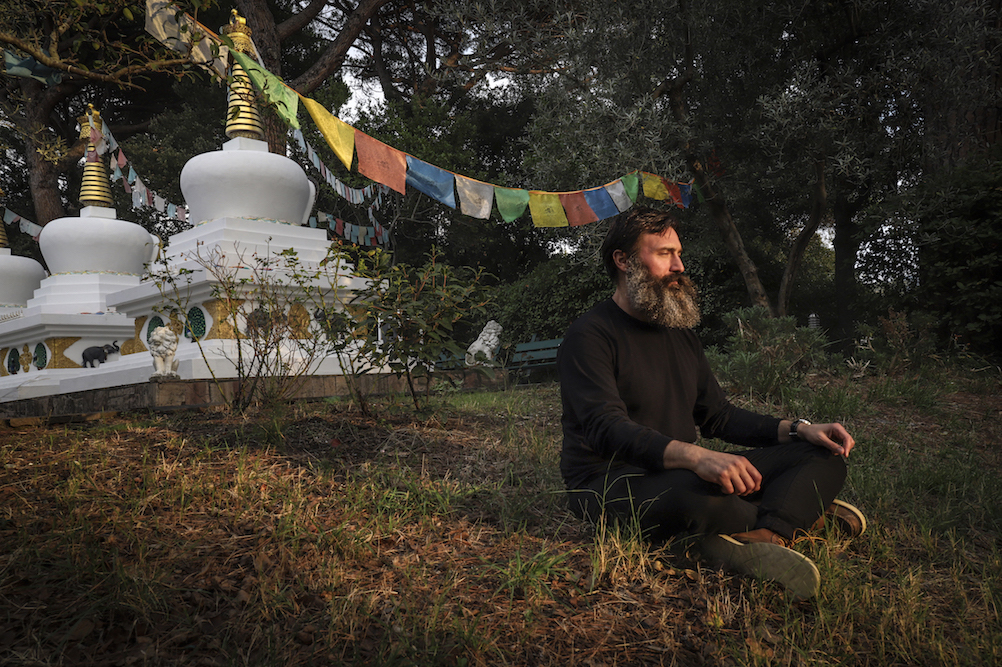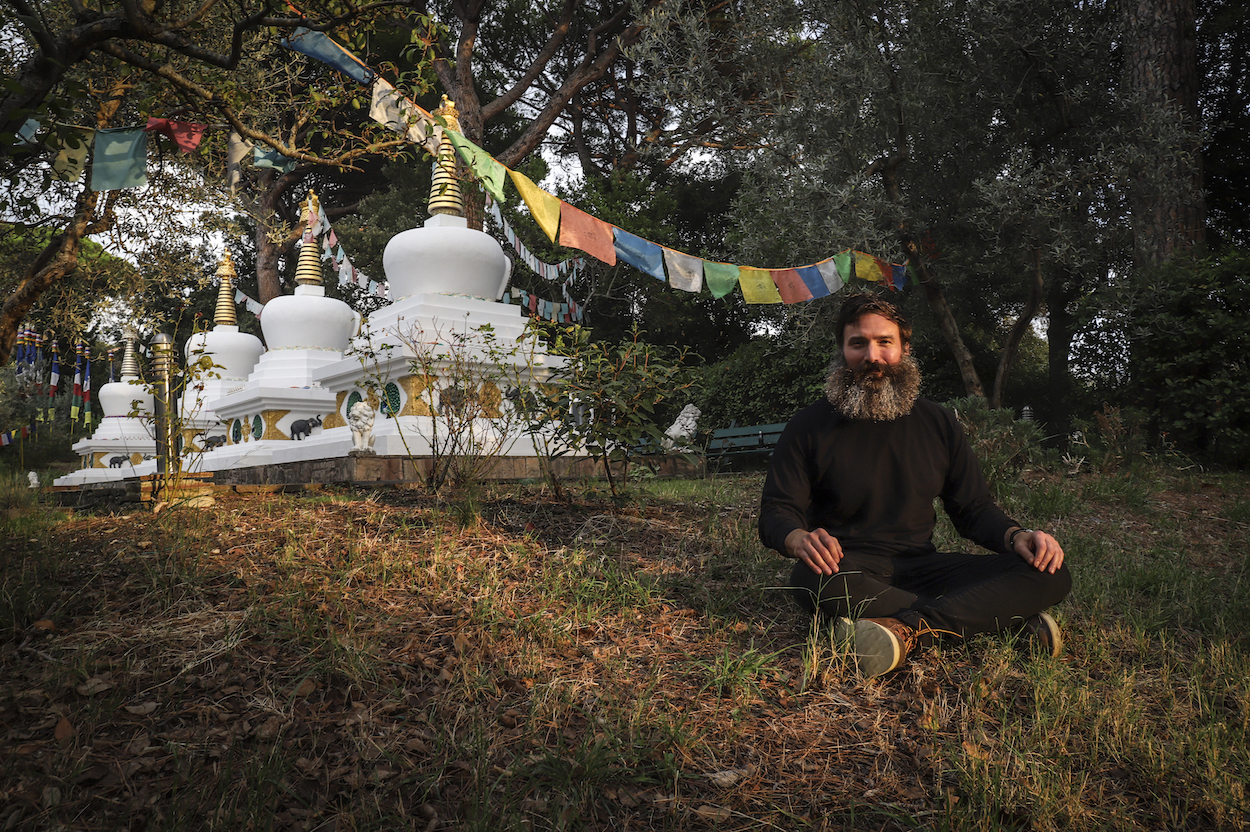FPMT’s online Masters Program through the eyes of a student
Almost a month ago, the Lama Tzong Khapa Institute hosted the teachings of the 104th Ganden Tripa, Kyabje Jetsun Lobsang Tenzin Rinpoche, welcoming more than two hundred people from all over the world.
With the Masters Program coming closer to its final module, the Grounds and Paths of the Secret Mantra, some of the online students came to the Institute to attend this event. Many of them met for the first time and had the chance to exchange ideas and impressions among themselves and the residential students.
Among them, we welcomed Shaun, an acupuncturist from the United States who has been following the Online Masters Program for the past years.
We seized the opportunity to talk to Shaun and ask him about his experience of being an online student of the Masters Program, in the hope to share his insight with all people who are considering taking up an FPMT online course.

Shaun, how did you hear about the online Masters Program offered by Lama Tzong Khapa Institute?
I had expressed an interest in expanding the scope of my study to a friend who is involved in more advanced Buddhist studies. She told me that she had heard good things about the study programs of Lama Tzong Khapa Institute and Nalanda Monastery (France), so I went to their websites, did some investigating, and here I am now!
If one is interested in the in-depth study of Buddhism and they don’t speak Tibetan, there is a limited number of programs around the world that they can choose from. This was my situation and I had to decide which way to go.
What was your experience with Tibetan Buddhism before you enrolled in the course?
I’ve only been studying Buddhism for about ten years now. I was very lucky to find a wonderful centre in Long Beach, California, that holds weekly courses and is directly affiliated with Ganden Shartse monastery in south India. I am still a student there.
What made you decide to follow the online program in favour of the residential program?
I don’t know if I even considered moving to the Institute. From the beginning I was definitely looking for something that would allow me to maintain my commitments to my life here in Los Angeles. Now, having visited, I would definitely love to study in Pomaia. I had such a wonderful time there.
According to you, what are the advantages and disadvantages of following the online program as opposed to the residential one?
I think the institute is very conducive to Buddhist studies. There are few distractions and very few external obstacles to pursuing Dharma practice. Even Ganden Tri Rinpoche remarked that all the external conditions for study are met at the institute.
As online students we cannot find the same structure, so we have to try and recreate it for ourselves. It is easy to fall behind if there is no consistency – so there are some disadvantages. The online program is an opportunity to have a little bit of both worlds, but I think the benefit depends on how strict you are willing to be with yourself – if you are a very self-motivated learner, then of course it’s much easier. With the online program, no one is going to be there to tell you that you have to attend classes and there’s no embarrassment if you don’t show up. You have to have your own structure and discipline.
I think that if one is able to follow the residential program and completely focus on the course material then that’s really quite wonderful. But I don’t think there’s a huge population of people that are able to undergo that level of intense study for an extended period of time. There are many advantages if one is able to devote a minimum of six years to studying the Dharma in an isolated fashion, but for some of us this is simply not feasible. So, the main advantage of the online program is that you don’t have to disrupt your regular life too much.
The Masters Program is quite amazing, and it really allows the student to have a taste of traditional Buddhist teachings.

How do you find a balance between studying and your everyday activities?
Fortunately, the teachings are recorded so the students can listen to them at their leisure. I think there are different ways of approaching the online study program. One way would be to listen as a person that’s just wishing to have some exposure to the information and another would be to approach it as a person that is fully pursuing the information, taking all the exams, taking all the quizzes, and looking to receive the credit and certification provided by FPMT. The program is flexible enough as to comprise both models: that of casual interest in Buddhism and that of more intense learning. If one is capable to follow all the teachings, then that is really wonderful – but there are also people in the online program that just listen to the review classes and people who follow the program without taking the quizzes and the exams. So, for an online student, there are many different ways to structure their study time according to the level of interest and dedication to the program.
It’s nice to wake up and listen to the teachings when there are fewer distractions, but there are some days when I might listen to the teachings while doing a different activity, with my headphones in. In my own structure I am a little bit loose, but I try to spend a minimum of thirty minutes to an hour everyday attached to the information of the program.
Also, the program runs from Monday through Friday and Saturday and Sunday are free days, so it’s very easy to catch up on the weekends. The one thing I would recommend is to keep a constant rhythm – if one gets very behind with the studies, then it’s difficult to catch up.
How demanding is the online program for you?
It’s demanding! Especially this year with Tarig and Pramāṇavārttika – these are dense subjects and it took a lot of extra time to even partly digest some of the more difficult points. So this year I learned how to not get too bogged down on one particular subject, but rather to move with the flow of the program and then revisit the subject in the study break.
I personally like to listen to Geshe Gelek’s lectures, and thus this is a bigger time commitment than just listening to the review classes. But there are online program students who only listen to our online tutor, Christian Steinert’s classes. These review classes are really wonderful and summarize Geshe Gelek’s words, giving a clear, condensed outlook on the teachings.
Do you think that the online program is structured in such a way that any person would be able to incorporate it into their everyday life?
I think it’s definitely doable! The program is very flexible: if a person wants to do a lot, there’s a pathway for them to do a lot, if a person wants to do a little, there’s a pathway for them to do a little. The online program is completely tailored to the individual. Even if one does the review classes and the review sheets, one spends two to three hours a week over the information and they’re still getting some exposure.
In the West we have this expectation that we’re going to perfectly know something if we study it just one time – but this is unrealistic. The Masters Program is a snapshot of twenty-plus years of study in the monastic institutions where these absolutely great thinkers are memorizing pages and pages of texts every day. We spend twenty minutes studying a piece of information and we’re so hard on ourselves if we don’t immediately understand it. I think it’s important for us to be patient and value the experience, learning over time. I think it’s important to expand our vision: we can start small and see where three hours a week of consistent study for six years will take us, instead of starting big and then giving up. Even if we don’t do the program completely, summing up even the smallest investment of time and energy over an extended period of time can give rise to great benefits, whereas doing nothing at all provides no benefit to our spiritual progress.

Can you tell us about the ethical component and the meditation component of the online program and how they can be implemented at home?
The program has certain structural guidelines provided by the FPMT and follows a conducive model for learning. With respect to the ethical component, it’s not that different from the pratimokṣa vows. It helps us to direct our energy in a constructive way towards our studies and to incorporate the program in general into our everyday life. The weekly meditations unfold in a graduated lamrim fashion following the steps on the path to enlightenment – this can be very helpful as well in placing what we are learning into an overall daily practice context.
The general structure of the program is that we have classes from Monday to Friday, the teachings are posted online that very day, or at the latest early on the next day. Our online tutor will generally post two review classes and worksheets throughout the week for us to go through. We have one quiz every week that is very helpful in highlighting the key points of that week’s teachings. The quizzes build up to the exam, and if someone fails the quiz the first time, they have one more chance to redo it after reviewing the answers.
I think that all the people involved in building up the program are very special and manage to convey this body of knowledge in a very structured and clear way, but it is also quite flexible.
In what way do you think that your life has improved following the study of the online Masters Program?
This is a tough question. Studying logic, karma, vows and so on underscores the importance of ethical self-discipline as the basis for a beginner’s practice so that is nice for someone like me.
What is your advice for the people who are considering applying for the online courses offered by the FPMT?
I think that if someone has an interest in Buddhist philosophy, they should definitely follow that interest. To have the opportunity and freedom to study Dharma is really great and rare. Here we have the course so nicely presented for us and we can listen to the teachings whenever we want, so if there is an interest in studying in a more in-depth way, then why not take it? The only reason would be thinking that one is not able to do the course perfectly and to be an “A student,” but I don’t think this really matters – one can start small and then see where their interest takes them.
I think this is a very special program. You can revisit pieces of information and grow your understanding in the future. Without making some initial investment, then there’s no way to learn any of this. Making the first step is very important.
If a person can listen to the classes and they do that for one month, one year, six years, then they will change, and they will reap the benefits little by little.
Is there anything that you would like to add?
Just to thank Geshe Gelek, Sophie our translator, Christian the English Program tutor, Venerable Tsultrim the education coordinator, and the technical support staff. I feel so fortunate to have everyone involved in the program be so qualified and dedicated to making this material accessible.

